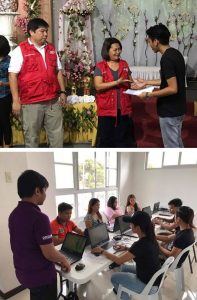
Photo 2: A data manager from the Disaster Response Assistance and Management Bureau (DReAMB) guides the volunteers in encoding the entries of DAFAC.
The Department of Social Welfare and Development (DSWD) has finished encoding the Disaster Assistance Family Access Card (DAFAC) entries of Internally Displaced Persons (IDPs) who have been affected by the ongoing armed conflict in Marawi City, aiding in the Department’s effective data management and better delivery of social services to the affected families.
The DSWD DAFAC plays an important role in monitoring the provision of assistance to the IDPs. It contains basic information on each displaced family, including where they are currently staying at; whether in the evacuation center or at their or relatives’ of friends’ houses. It also helps keep track of the services extended to the families from the start of the crisis to the Early Recovery Phase.
In a ceremony held yesterday, DSWD Undersecretary for Operations and Protective Programs and the Department’s coordinator of its Marawi crisis relief efforts, Hope V. Hervilla, together with Disaster Response Assistance and Management Bureau (DReAMB) Director Felino O. Castro V awarded the Certificates of Recognition to the volunteers who helped encode thousands of DAFAC entries.
The volunteers include students from the Mindanao State University – Iligan Institute of Technology (MSU-IIT) and St. Michael’s College, Department of Information and Communication Technology (DICT), Local Government of Iligan City, Ranao Rescue Team, and the International Organization for Migration (IOM).
“With the number of affected families reaching more than 100,000, effective data management has become one of the main challenges in the delivery of services. We want to thank the volunteers who gave their time and energy to encode the entries of DAFAC. You played a huge part in improving the delivery of government services to the Marawi IDPs through sound data management,” Usec. Hervilla said.
Dir. Castro remarked, “Truly, the bedrock of an effective disaster response is information. Thank you to the volunteers for taking part in this important initiative.”
DSWD-Field Office (FO) X Regional Director Nestor B. Ramos also expressed his gratitude to the volunteers.
“Your little support is a big help for the people of Marawi,” he said.
The Department’s disaster response team from its Central Office and concerned field offices together with the volunteers started to encode the entries earlier this month and finished on Tuesday. The volunteers were guided by data managers from the Disaster Response Operations Monitoring and Information Center (DROMIC), a division of the DSWD DReAMB.
The encoded entries will be reviewed to come up with a clean master list of all IDPs, which will be the basis for providing further interventions to the IDPs.
Meanwhile, the DSWD and its concerned FOs continue to provide assistance to Marawi IDPs.
“The DSWD regularly provides family food packs (FFPs) to the affected families both in the evacuation centers and those staying with their friends and relatives, although we are still facing difficulty in providing food assistance to those near the conflict zone. We have been working with local government units (LGUs) and the Armed Forces of the Philippines (AFP) for this. We get clearance from the AFP before delivering FFPs to critical areas,” Usec. Hervilla said in a phone patch interview aired over a media organization.
The Undersecretary said that the Department is also trying to add some variety in the contents of its food packs, to include dried fish, mongo beans, turmeric powder, sugar, and other food and ingredients.
“We understand the difficult situation that our fellow citizens from Marawi have been experiencing. They are becoming more and more restless, demanding more services from the government. We are doing our best to ensure that our resources are sufficient so we can sustain our relief efforts,” Usec. Hervilla explained. ###


